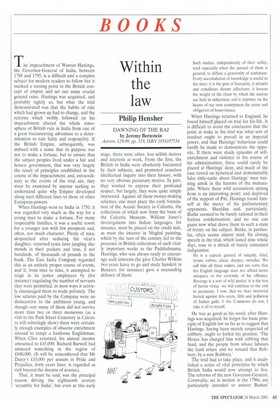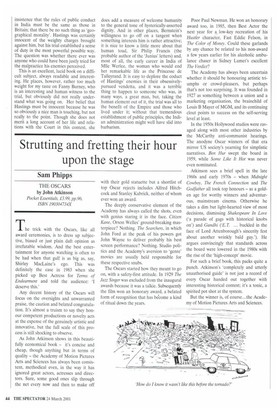Within the law
Philip Hensher
DAWNING OF THE RAJ by Jeremy Bernstein Aurum, £19.99, pp. 319, ISBN 1854107534 The impeachment of Warren Hastings, the Governor-General of India, between 1788 and 1795, is a difficult and a complex subject for modern readers to follow but it marked a turning point in the British concept of empire and set out some crucial ground rules. Hastings was acquitted, and probably rightly so, but what the trial demonstrated was that the habits of rule which had grown up had to change, and the reforms which swiftly followed on his impeachment altered the whole atmosphere of British rule in India from one of a great buccaneering adventure to a determination to rule fairly and responsibly. If the British Empire, subsequently, was imbued with a sense that its purpose was not to make a fortune, but to ensure that the subject peoples lived under a fair and honest government, that was very largely the result of principles established in the course of the impeachment, and, extraordinary as the events of the trial are, they must be examined by anyone seeking to understand quite why Empire developed along such different lines to those of other European powers.
When Hastings went to India in 1750, it was regarded very much as the way for a young man to make a fortune. For many respectable families, it was a useful resort for a younger son with few prospects and, often, not much character, Plenty of men, despatched after seducing the vicar's daughter, returned years later jangling diamonds in their pockets and tens, if not hundreds, of thousands of pounds in the bank. The East India Company regarded this as an entirely proper course of events, and if, from time to time, it attempted to reign in its junior employees by (for instance) regulating the number of servants they were permitted, in most ways it actively encouraged them to trade privately. The low salaries paid by the Company were no disincentive to the ambitious young, and though very many of them did not survive more than two or three monsoons (as a visit to the Park Street Cemetery in Calcutta will soberingly show) there were certainly enough examples of obscene enrichment around to tempt a footloose Englishman. When Dive returned, his annual income amounted to £45,000; Richard Barwell had amassed something in the region of £800,000. (It will be remembered that Mr Darcy's £10,000 per annum in Pride and Prejudice, forty years later, is regarded as rich beyond the dreams of avarice).
That, it must be said, was the principal reason driving the eighteenth century 'scramble for India', but even at this early stage, there were other, less selfish desires and interests at work. From the first, the British in India were absolutely fascinated by their subjects, and promoted ceaseless intellectual inquiry into their history, with no very obvious pecuniary motive. In part, they wanted to express their profound respect, but largely, they were quite simply interested. Against all those money-making schemes, one must place the early foundation of the Asiatic Society in Calcutta, the collections of which now form the basis of the Calcutta Museum. William Jones's investigations into Indian languages, for instance, must be placed on the credit side, as must the interest in Mughal painting, which by the turn of the century led to the presence in British collections of such vitally important works as the Padshahnama. Hastings, who was always ready to encourage such interests (he gave Charles Wilkins two years leave to go and study Sanskrit in Benares, for instance) gave a resounding defence of them: Such studies, independently of their utility, tend especially when the pursuit of them is general, to diffuse a generosity of sentiment. Every accumulation of knowledge is useful to the state: it is the gain of humanity, it attracts and conciliates distant affections: it lessens the weight of the chain by which the natives are held in subjection; and it imprints on the hearts of our own countrymen the sense and obligation of benevolence.
When Hastings returned to England, he found himself placed on trial for his life. It is difficult to avoid the conclusion that the point at stake in the trial was what sort of conduct ought to prevail in an imperial power, and that Hastings' behaviour could hardly be made to demonstrate the opposite. If there were shady episodes of selfenrichment and violence in the course of his administration, these could rarely be placed at Hastings' door, and much of the case rested on hysterical and demonstrably false tittle-tattle about Hastings' men running amok in the harems of the maharajahs. Where these wild accusations sprang from is an interesting point; and deprived of the support of Pitt, Hastings found himself at the mercy of his parliamentary opponents. Sheridan and, particularly, Burke seemed to be barely rational in their furious condemnation, and no one can guess now what drove them to such a state of frenzy on the subject. Burke, in particular, often seems almost mad; his closing speech in the trial, which lasted nine whole days, rose to a shriek of barely contained indignation: He is a captain general of iniquity, thief, tyrant, robber, cheat, sharper, swindler. We call him all these names, and are sorry that the English language does not afford terms adequate to the enormity of his offenses. Revenge is a sort of wild justice: it is the test of heroic virtue we will continue to the end to persecute. I vow, that we bear immortal hatred against this scum, filth and pollution of Indian guilt; if the Commons do not, I take it all to myself.
He was as good as his word; after Hastings was acquitted, he forgot the basic principle of English law so far as to suggest that Hastings, having been merely suspected of robbery, ought to forfeit his pension. 'The House has charged him with robbing that fund, and the people from whose labours the fund arises; and we reward that Robbery, by a new Robbery.'
The trial had to take place, and it established a series of vital principles by which British India would now attempt to live. The reforms of the new Governor-General, Cornwallis. set in motion in the 1790s, are particularly intended to answer Burkes' insistence that the rules of public conduct in India must be the same as those in Britain; that there be no such thing as 'geographical morality'. Hastings was certainly innocent of the weighty charges brought against him, but his trial established a sense of duty in the most powerful possible way. The question was whether there ever was anyone who could have been justly tried for the malpractice his enemies perceived.
This is an excellent, lucid book on a difficult subject, always readable and interesting. He places, however, rather too much weight for my taste on Fanny Burney, who is an interesting and human witness to the trial, but obviously did not really understand what was going on. Her belief that Hastings must be innocent because he was so obviously a nice man is touching, but not really to the point. Though she does not merit a long account of her life and relations with the Court in this context, she does add a measure of welcome humanity to the general tone of hysterically-asserted dignity. And in other places, Bernstein's willingness to go off on a tangent when something interests him is rather attractive; it is nice to know a little more about that human toad, Sir Philip Francis (the probable author of the 'Junius' letters) and, most of all, the early career in India of Mlle Werlee, the woman who would end her remarkable life as the Princesse de Talleyrand. It is easy to deplore the coduct of Hastings' enemies in their obsessivelypursued vendetta, and it was a terrible thing to happen to someone who was, in many ways, a great man, but, taking the human element out of it, the trial was all to the benefit of the Empire and those who lived under it; without that tremendous establishment of public principles, the Indian administration might well have slid into barbarism.















































































 Previous page
Previous page